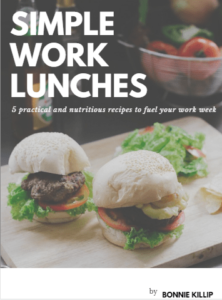Become sharper, faster, stronger (mentally).
5 ways what you eat may be bringing your mood, energy and concentration down and simple changes to best fuel mental fitness for productivity and success today and a strong and healthy tomorrow.
Most of us understand the concept of physical fitness and know there are certain steps that if taken will lead to increased physical fitness (whether we take these steps or not is another story). On the other hand, are you aware there are similar steps you can take to improve and support your mental fitness? If you are aware do you know what these steps are? And most importantly if you know what they are do you regularly practice them?
There is only one true secret ingredient to creating health and that is action.

While physical health is largely thought of as being within our control to change and improve, most of us don’t view our mental health in the same way. In general, we tend to see mental health as a bit more out of our hands and a fair bit more complicated than physical health because we imagine it is the result of a combination of factors beyond our control including our genes, our experiences and our environment. While we recognise some people are more mentally strong and resilient than others we simply interpret this to mean it comes naturally to them. In actuality when you scratch beneath the surface those that are truly mentally strong have consciously and purposefully developed this strength just as an Olympic athlete deliberately trains and develops their physical strength.
Your genes, your environment and your experiences will always influence how you interact with the world but ultimately all these factors really are just influences or contributors and there is one omnipotent ruler which has the final say. This supreme ruler is your brain. If you want the final say to be powerful, meaningful, productive, resilient, compassionate or any other word that is in your best interest and the best interest of those you love then you must take the steps to fuel a brain capable of supporting the qualities and outcomes you want. Key to having a strong and productive response is developing your mental fitness because in the same way that an athlete cannot go out and win a marathon without training and being in peak fitness you cannot expect to go out and deal with the hard things in life to the level you want (and deserve) if your mind and body are not adequately equipped. You can’t expect of your body nor your mind something you are not capable.
So, how do you become capable (mentally strong)? By taking some simple steps to set yourself up to become mentally fit because mental strength can’t be turned on when you need it if you haven’t developed a level of fitness in the first instance. This will improve your mood, vitality, focus, productivity, success and enjoyment of life right now and what is truly beautiful is that these same actions that produce success in the short-term flow over into creating health for the long term. Mental and physical health really do go hand in hand and the actions to become mentally fit will reduce your risk of a number of diseases such as heart disease, depression, anxiety and Alzheimer’s disease (yes, even if you have the genes for these diseases). I want to say it’s not magic because there are definite strategies, methods and tools that will lead to improved results and real outcomes yet at the same time it absolutely is magic because these strategies, methods and tools lead to living and experiencing a high-quality, interactive and thriving life and there is no outcome more magical than this.
There are 3 integral principles that set the foundation for initiating and developing physical fitness which can be directly translated to developing mental fitness.
1. Fuel
Physical fitness requires you to fuel your muscles and mental fitness requires you to fuel your brain. When your brain is receiving suboptimal nutrition everything is hard and everything is an effort. You must get this part, you must fuel your body well before you can even hope to advance in fitness. When you are fuelling your brain optimally everything is doable and, in the times, and places where it is not doable you know you can and will find a way.
Without good nutrition you can’t succeed at the following two mental fitness principals (consistency and rest) because no amount of consistency, rest, drugs, medical intervention, therapy nor any other form of help or ‘tretment’ will fix the problem if it has a nutritional origin.


2. Rest
Becoming physically strong and building muscle requires that the fibres of your muscles get continuously torn during your workouts. It is only during rest that these muscle fibres heal from the damage and not only does rest allow for healing but it also is the time when these muscle fibres grow back stronger than before the training. This is compensation so that you will then be capable to deal with higher future stress and therefore lessen future damage. Mental health is the same in that it is through the hard times that your mental capacity gets stretched and torn and it is only by allowing yourself to rest and reflect that you will heal and grow. If you let it rest is crucial for the learning and this is what will make you capable of dealing with higher loads, come back stronger and quicker and experience less damage in the future.
3. Consistency
In the same way that it takes more than one trip to the gym to gain physical fitness it also takes more than one attempt to develop mental fitness. To build physical fitness you must continuously use the muscles you wish to strengthen, to build mental fitness you must continuously use resilience strategies. These resilience strategies include being consistent in both rest and fuelling your body right.

In this post we are going to explore Principal number 1. Fuel in detail by looking at 5 common nutrition pitfalls that may be wreaking entirely unnecessary havoc with your mental health, mood and vitality. I will also suggest a few practical ways you can quickly and easily rectify each of these pitfalls to gain fast improvements and become sharper, faster and stronger. Ultimately, today’s post is all about the doing side, it’s about getting in there and taking action to develop and fuel mental fitness for vitality, focus and long-term health or if you’d prefer to think of it as a recipe for creating magic that would be equally correct.
Challenge Number 1: Vitamin or Mineral Deficiency
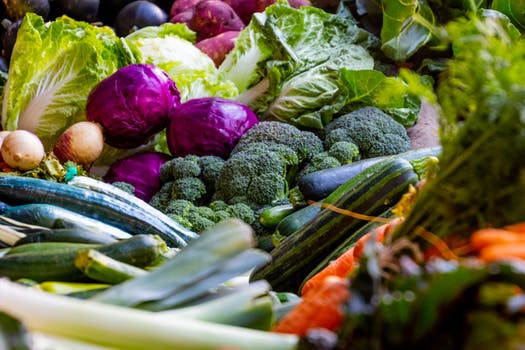
Beyond the three macronutrients (macros) carbohydrates (carbs), fat and protein that your body requires in large amounts as fuel and as structural building blocks you also require a fairly extensive array of vitamins and minerals in smaller amounts (together referred to as the micronutrients). There are 16 different minerals (chromium, selenium, copper, iron and magnesium and so on) and 13 vitamins (8 B vitamins, vitamin C, A, D, E and K) essential to life. Let us take the example of iron in order to highlight the effects a deficiency in just one of these essential micronutrients can have on your mental health. Iron deficiency is a fairly common deficiency and occurs for a number of reasons including not eating a diet that is high enough in iron containing foods to meet your body’s requirements. Iron deficiency can make you irritable, lower your mood (depressive symptoms), make you easily fatigued, dizzy, short of breath or feel generally tired, weak and overwhelmed. Take a moment to stop and really think about how meaningful and impactful the repercussions of a deficiency in iron would be on your experience of daily life. All these symptoms are profound and far reaching and you have to keep in mind that each of the other 29 micronutrients play equally important roles as iron and a deficiency in any will be imposing limits on your mental capabilities.
So, with the knowledge that vitamin and mineral deficiencies can greatly affect my mental health how do I meet my requirements for all nutrients?
The first part of the answer to this is through eating a variety of foods. Eating a variety of food ensures you are getting all the essential nutrients. The second part of the answer is eating adequate amounts of these foods so that you are getting these nutrients in amounts that meet your requirements.
Variety and adequate amounts of food are both key to ensuring you get all the nutrients your body needs because foods do not contain the same nutriments and if they do have some vitamins and minerals in common they will contain them in different amounts (sometimes drastically so). For example, 28 grams of brazil nuts contains 544 micrograms of selenium, a cup of broccoli contains 2 micrograms and a cup of carrots contains none. Therefore, you would need to eat 14cups of broccoli to get the same amount of selenium as is in 28g of brazil nuts. This is why eating an adequate amount is important in that just because a food contains a certain micronutrient does not mean a ‘normal’ serve size contains it in an amount that meets your body’s daily requirements. On the other hand, if you are lacking selenium no amount of carrot eating will get your needs met. That’s why variety is important by choosing a variety of foods it all adds up over the day to meet your needs.
How to:
To improve the variety of your diet, include foods from all five food groups every day and make mixed choices from within these groups (a reminder of the 5 food groups is given below with some examples from each group. If you remember you can skip over this). For example, if you always eat apples and bananas from the fruit group consider branching out and including some berries, pineapple or passionfruit (just to name a few examples). This will expand the variety of nutrients you will be taking in. A fun thing I like to do when I travel is to imagine each weird new food I try as having the potential to give my body a dose of something it may otherwise never have received, and it could be the secret ingredient to imparting superhuman powers or at the very least boosting my brain power!
You don’t need to travel to explore and have fun with food. We are incredibly blessed in that we have available to us a huge array of foods to choose from, most likely more than ever in the history of our species. We can buy foods that are native to other parts of the world that our ancestors never would have had access to such as kiwi fruit from China, avocados from South America and coconuts from Indonesia. It truly is amazing! So, embrace this opportunity you have to vamp up the culinary experimentation in your life and know that you are working wonders with your mental health by doing so. This week try just one new food.
A reminder of the five food groups and some examples of foods from each group:
- Meat and alternatives (nuts, eggs, tofu, legumes, beef, chicken, fish)
- Dairy and alternatives (soymilk, tofu, almonds, yoghurt, cheese)
- Grains (oats, quinoa, bread, rice, pasta, rye, burghul, couscous, semolina)
- Fruit (watermelon, banana, berries, apricots, mandarins, cherries)
- Vegetables (broccoli, sweet potato, corn, pumpkin, bok choy, eggplant, beetroot)
Challenge Number 2: Low Energy (Calorie) Diet
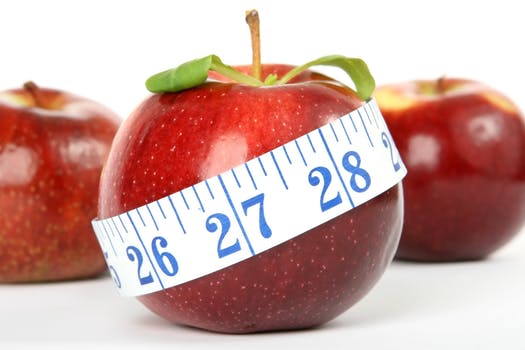
With so much focus on obesity and weight loss I think the harm of low fat eating is an area that is greatly overlooked. If you compare how many nutrition messages you can bring to mind which are focused on decreasing portion size and cutting calories as opposed to messages encouraging high energy or even adequate energy diets for that matter. There just really aren’t many (any?). Even the majority of our dietary guidelines are targeted at cutting down on the amount of energy we eat. The paradox here is that energy is something we all want yet when it comes to food we’re told to avoid it. Calories are quite honestly the golden units that keep us alive and we treat them as pests and promote avoiding them. This is like promoting avoiding life!
The prevailing message to avoid calories is to the detriment to mental functioning because your brain has incredibly high metabolic requirements. Your brain needs a lot of energy to function let alone function optimally and this energy comes from nowhere else but the food you put into your mouth. To give you an appreciation of just how much energy it takes to run the incredible supercomputer that is your brain consider that ¼ (25%) of all of the energy you eat in a day is diverted straight to your brain! (This is remarkable because your brain makes up only around 2% of your body weight). Whether you are not getting enough energy due to irregular eating patterns over the course of a day or chronic energy deprivation both affect your mental acuity, functioning and health. If you are not eating enough food to cover the needs of your brain (let alone the rest of your body) this can manifest in many mood alterations such as low concentration, irritability, apathy, sensitivity or anxiety. All of which are your brain’s way of telling you that you need to eat more. What is most important here is that many people do not link symptoms like these to the food they are eating (or not eating) and they may try a bunch of other things to feel better but if the underlying nutritional cause goes unrectified these other tactics and treatments can only afford minimal if any help.
Ensuring you are fuelling your body with enough energy is, in theory, easy but theory often doesn’t translate well into the real world so let’s take a look at a few things you can give a go to support higher brain functioning, sharper focus, smarter and stronger thinking and therefore higher engagement with life.
How to:
- Include nutritionally dense foods at each main meal. By this I mean your meals should be based around a source of complex carbs (wholegrains, potato etc), protein (fish, beans, nuts, egg, tofu, cheese etc) and fats (avocado, olive oil, nuts etc).
- For the most part choose wholefoods and foods with nutritional value over foods which are purely stimulants but not giving you actual energy or nutrients for example coffee, energy drinks and artificially sweetened soft drinks. While these foods make your body think that it is getting some energy and nutrients it actually isn’t. These foods are all in themselves ok but if you are reliant on them to get you through the day you might find your dependency on these is a result of your diet lacking in energy and your brain is actually asking for more calories and/or nutrients. Try upping your intake of nutritious foods and see how your mood, focus and energy levels improve and your dependency or desire for those other quick fixes decreases. When you can fuel your body naturally you really shouldn’t feel a need for these other foods besides for the flavour and enjoyment (again equally worthy of including in your diet for these reasons alone but not as a dependency).
- Eat regular meals and snacks so you don’t have to rely on getting all your energy needs met in one or two meals and being compromised if for any reason you miss one of these. This point flows into the third common nutritional pitfall that plays with your emotions and that is irregular eating.
Challenge Number 3: Irregular Eating

As we talked about above irregular eating in the form of skipping meals or going long periods without eating can be one of the contributing factors to not getting enough energy to fuel your body and brain at the level they need to operate at the peak performance you expect (and deserve). You cannot live an optimal life on suboptimal fuel.
Irregular eating messes with your blood sugar or blood glucose levels (BGLs) and your BGLs are highly influential to your emotions and mood. Your body works hard to maintain your BGLs within a narrow range that allows for a reliable and consistent delivery of sugar to your brain (and all organs within your body) to use for fuel. Between meals and overnight your body breaks down glycogen which is stored in your muscles and liver into sugar (glucose) and this is released into your bloodstream to maintain your BGLs and keep up with your body’s requirements. When these glucose stores are depleted your BGLs begin to drop, signalling to your brain that you need to eat to bring them back up again. If you don’t eat and your BGLs stay low you can feel irritable, tired, weak, lethargic, foggy headed and more prone to making mistakes, snapping at people you care about, anxious, depressed and so on. None of these words are how I want you to be describing your regular state and experience of life especially not when we can do so much about it!
Can you think of a time you were irritable (hangry) when you were hungry, and it wasn’t until after you ate that you calmed down and could see everything more clearly? If you know this feeling you will see why it is important to eat regularly because while it may not always get to this extreme level, in order to prevent overwhelm and keep your mind clear and focused regular meals are key. If you find you are more sensitive or become easily upset or regularly overreact to emotional situations more than you would like I encourage you to observe your eating pattern before thinking something more serious is going on with your mental health.
How to:
While your body does a fantastic job at regulating your BGLs you can help it out and keep your mood and energy stable by having regular meals and snacks.
If you don’t currently have regular meals every day I encourage you to give it a try because you really might be surprised with the results.
- Have 3 regular main meals (i.e breakfast, lunch and dinner)
- Also have 2-3 snacks between these main meals.
What foods you choose will depend on your preferences, what you have available and what activities you do during your day. In general, main meals should be based around a complex carb, protein and fats with some vegetables and/or fruit. If you have a busy schedule it might be worth planning your meals ahead of time for some easy and quick workday breakfast and lunch suggestions click the images below to download my free ebooks.
Don’t underestimate the power of regular meals and stable BGLs to improve mood and productivity just because the cure is simple it doesn’t mean it isn’t effective! I have worked with people supporting them to make the small changes of eating regularly and have seen and felt first-hand the monumental improvements in mood and positivity to the point where they were like two completely different people. Also, a little disclaimer to keep in mind is that just because the cure is simple it doesn’t mean that the doing part is easy. For this reason, I always encourage you to seek support when you plan to make any dietary changes because with support and encouragement and someone cheering for you it can be a whole lot easier, more rewarding, quicker and let’s face it more fun!
Challenge Number 4: Low Fat Diets
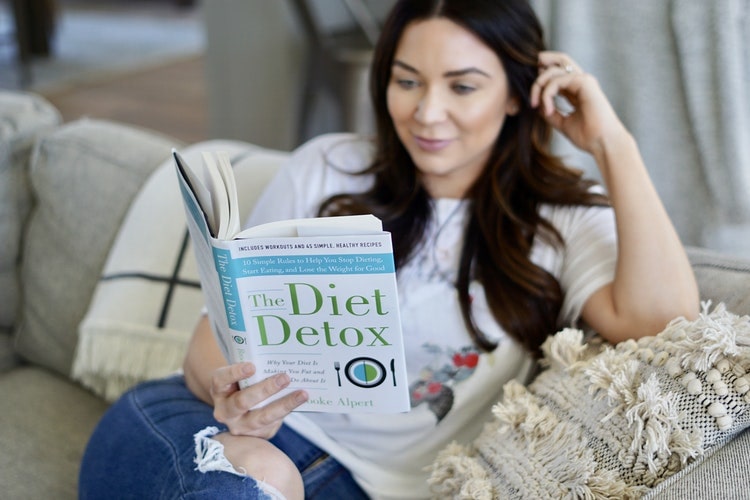
What is your first reaction when I say you may be limiting your mental ability and negatively impacting your mental health by following a low-fat diet? (and I’m not just referring to the mental turmoil of denying yourself or missing out on the flavour of all the delicious high fat foods!). I’m talking about the way that restricting your fat intake (as most of us have been told is healthy) may actually be limiting the systems in your body directly responsible for regulating your mood and emotions in particular your hormones because in these systems fat plays s a starring role.
I often think of fat as the forgotten nutrient, because we’ve become so comfortable with the messages telling us to avoid fat that I don’t imagine many people are concerned about ensuring they meet their fat intake in the way that they are about meeting other macro goals like protein. Even the most recent Australian healthy eating model has fats off to the side implying they are an optional extra and the latest American healthy eating model developed by the United States Department of Agriculture ‘MyPlate’ lacks a section for fat per se altogether. From my point of view fat really should be a sixth food group because it is key to mental health and there is no health without mental health.
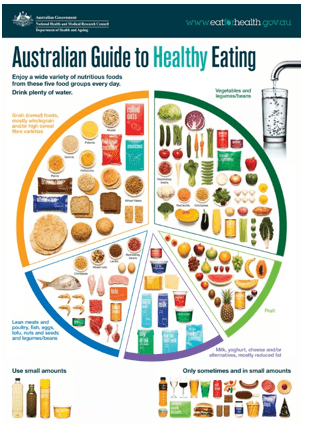
1
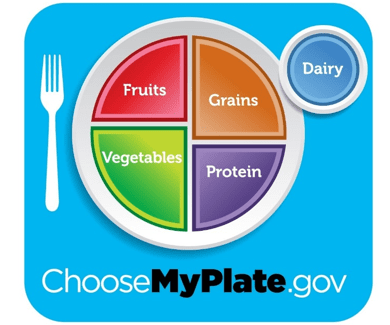
2
Let’s take a look at why fat deserves a great deal more respect than we seem to give it.
First of all, did you know that all the cells which make up your body as well as your hormones contain fat and cholesterol?
Your hormones exert huge control over your mood, emotions and mindset all of which govern your experience of life. Fat basically controls how you feel and to me feeling good is way up there on my list of things I value. Therefore, it is important to eat adequate amounts of fat to support optimal hormone production and function because imbalances in hormones can contribute to mental health problems such as depression.
On top of being crucial to hormone synthesis your brain itself is made up of 60% fat and contains 25% of the cholesterol in your body. It is the fatty covers (myelin sheaths) that encase your nerves which allow for quick transmission of nerve impulses and therefore quick, sharp and smart thinking and reaction.
Fats are also needed for the optimal absorption of some of the vitamins found in foods (Vitamins A, D, E and K also known as the fat-soluble vitamins). This means if you eat foods containing these vitamins with a fat source you will increase your bodies absorption of these nutrients. An example of how to do this would be to make a nice olive oil dressing or add some sliced avocado or a handful of nuts or seeds to your next salad because green leafy vegetables are high in vitamins A, E and K and the fat will help your body to better absorb these nutrients. It is great news that you can enhance your uptake of vitamins through some food combinations like this because you can eat all the vitamins and minerals in the world but if these nutrients aren’t getting absorbed from your digestive tract than they’re unavailable for your body to use. If they’re unabsorbed it’s essentially like you didn’t eat them in the first place. The fact that fat gives a little helping hand to the absorption of these four vitamins is exciting and ingenious. There are actually a lot of interesting little food combinations similar to this which enhance or hinder our uptake of nutrients and I will do a post of a few examples at another time for anyone who’s interested in this fascinating area.
It is the foods higher in unsaturated than saturated or transaturated fats that we want to include as our main fat sources because while fat is crucial to healthy eating too much saturated and transaturated fat has been linked to increased risk of developing chronic diseases like heart disease (even this is being highly debated at the moment and I will definitely be doing future post on this topic but for now we will follow the dominant guidelines). Unsaturated fats have been shown to have anti-inflammatory effects and because chronic inflammation has been linked to many diseases including depression, Alzheimer’s disease, anxiety and autism therefore you can see the potential of this information but the power is only unleashed through our actions.
How to:
I encourage you to add some healthy fats into your diet especially in place of where you might be having highly processed or low-fat foods. Some good sources of unsaturated fats include avocado, nuts and seeds and nut butters and olive oil.
Challenge Number 5: Low Quality Foods

Low quality food or ‘junk food’ as we more commonly refer to them are foods which have been highly processed. When I say highly processed I mean most of their nutrients (vitamins and minerals) have been lost in the processing and refining. Examples of foods we usually associate with being of low quality (keep in mind this does depend on the ingredients and there are for sure some super nutrient packed healthy versions!) include jam, cakes, ice-cream, white bread, chocolate, jelly, processed meats (for example salami) and lollies. These types of foods do have a place in a healthy diet because they are delicious and add variety and richness to our lives however what I am suggesting here is not cutting them out but recognising that they should not be the main source of energy in your diet because these foods don’t provide your body with a the micronutrients it needs to function optimally. It’s similar to trying to get your car to run off water, while water is one of the things a car needs to run optimally water alone will not run it. You have to put in the right type of fuel to produce the desired effects and ultimately get you where you want to go. Your body is similar in that it needs all the components in order to run effectively and even more so if you want to have a chance at running optimally and recognising your potential.
Frequently eating low quality foods that are high in sugar and not much else (soft drinks, lollies etc) means the sugar is quickly absorbed into your bloodstream causing a peak and then a drop in your BGLs as your body works hard to take this sugar into your cells to lower your BGLs back within the range it likes. High BGLs are recognised as one of the most influential factors in depression. To prevent extreme rises and dips in BGLs and the corresponding peak and crashes in mood, concentration and vitality I suggest having meals and snacks which will stabilise and maintain your BGLs. Foods which are kinder on your BGL response are those which are minimally processed because they contain other substances which slow the digestion and absorption of sugar in to your bloodstream, remember your body was created to run off wholefoods.
As well as being low in vitamins and minerals and causing mayhem with your BGLs highly processed foods are low in fibre. Fibre is the roughage in food and is a great prebiotic for your gut bacteria, that is it makes a good home and food source for your gut bacteria. The importance of our gut bacteria to our health is becoming more and more evident and there is a growing body of research suggesting that the type of bacteria in our digestive system have a huge influence over our mental health. This subject is quite complex and interesting, (and you guessed it I am going to cover it in another post). For now I want to give one quick example of how your gut bacteria and gut health affects your mental health and that is using the case of serotonin. Serotonin is a chemical that lives up to its common name ‘the feel-good hormone’. What is interesting about the feel-good hormone is that scientists now recognise that the vast majority of serotonin, up to 90%, is produced not in our brains as was once thought but in our digestive tract! Amazing! Loud and clear evidence linking healthy nutrition to fostering a healthy digestive tract and correspondingly supporting strong mental health.
How to:
If low quality foods are making up the larger part of your diet here are some examples of swaps or combining lower quality foods with other foods so they don’t affect your BGLs in the same peak and drop pattern. These suggestions are some things you might want to think about to increase your intake of vitamins, minerals and fibre (remember this isn’t all the time it is definitely still good to have the lower quality foods because they bring a lot of enjoyment and versatility to eating and this is as much a part of healthy eating as getting all the right nutrients is!)
- Eat fruits and vegetables with the skin on
- Include nuts and seeds as snacks or toppings to meals (think pumpkin seeds sprinkled over porridge, pecan nuts tossed into a salad or roast cashews mixed through an Asian stir-fry).
- Choose wholegrain cereals more than refined for example swap white bread and jam for whole wheat bread and peanut butter (little biased here because I do love peanut butter!)
- Swap soft drink for a nourishing smoothie (think milk, banana, strawberries, peanut butter)
- Learn to make a few baking recipes yourself. This is the really fun part. If you love cakes, muffins, biscuits and other baked goods and eat these regularly I would never say cut them out but I do suggest looking for recipes which are equally delicious and use a variety of flours such as whole wheat or rye flour and no or little added refined sugar. It’s not the baked goods that are inherently unhealthy it is what goes into them, or depending how you look at it what is left out of them, because each time we eat it is an opportunity to get a good dose of nutrients to fuel our mental training.
Take Home Messages



The power nutrition exerts over our mood, emotions and overall mental health cannot be overemphasised.
Now you’ve got a fairly comprehensive list of tactics for the fuel part don’t forget to combine these with the other two crucial areas to developing mental fitness that we started this all off with:
1. Fuel
2. Rest
3. Consistency
If you identified any of these 5 ‘challenge areas’ within your current eating pattern, then I encourage you (or challenge whichever motivates you most!) to give some (or all) of the suggestions in this post a go. I honestly know that you will flourish because you’ve made the commitment and you’ve put in the work and it is your life now. I can’t wait to hear what you are up to and the changes you experience as you develop and fuel your mental fitness.
Please comment below or send me a private message because I love sharing in your wins and I am celebrating with you every step of the way!
Happy Training

With my whole heart I hope you found this information useful and inspiring.

Become Great. Live Great.
Bonnie
Reference
1. Australian Government. Department of Health. 2017. Australian Guide to Healthy Eating. Accessed on 02.09.2018. Available from: https://www.eatforhealth.gov.au/guidelines/australian-guide-healthy-eating
2. Harvard T. H. chan. School of Public Health. 2018. ChooseMyPlate.gov. Accessed on 02.09.2018. Available from: https://www.hsph.harvard.edu/nutritionsource/healthy-eating-plate-vs-usda-myplate/


